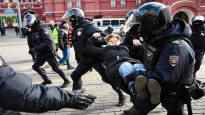The new law concerns the dissemination of information on, among other things, the activities of the Russian National Guard and embassies abroad. The law extends the previous law on the Russian army.
The Russian state continues to tighten its grip on the media. The lower house of the Russian parliament on Tuesday passed a new law on the dissemination of false information.
The law prohibits the sharing of false information about the actions of Russian authorities abroad. These bodies include delegations, the Prosecutor General and the National Guard.
The penalty can be up to 15 years in prison. Such a long sentence is possible if the information disseminated is considered to have serious consequences.
In other cases, the penalty may be a shorter prison sentence or a fine.
Finally, the law will come into force after the President of Russia Vladimir Putin has signed it after approval by the upper house of Parliament.
A law passed by the Duma on Tuesday extends an earlier law banning the dissemination of false information about the Russian military.
In practice, the law has prevented the Russian media from calling the war in Ukraine a war. The Russian leadership uses the term military operation as a special operation.
The traditional radio station stopped
The Russian state has hindered the free flow of information in many ways even before the war in Ukraine. Since the attack, freedom of speech has narrowed further rapidly.
Yesterday, a Russian court ruled that Facebook and Instagram remain banned in Russia. This is because the court found U.S. media giant Meta guilty of extremist business.
The blackmail of recent weeks has also sparked a new type of resistance in Russia. In mid-March, a reporter for Russia’s number one channel Marina Ovsjannikova protested against the war. He aired a live poster urging him to end the war and not believe in propaganda.
The rapture attracted a great deal of attention around the world. Ovsjannikova has already received fines of about 250 euros for an anti-war Finnish video. He is currently awaiting possible charges against the TV protest itself.
